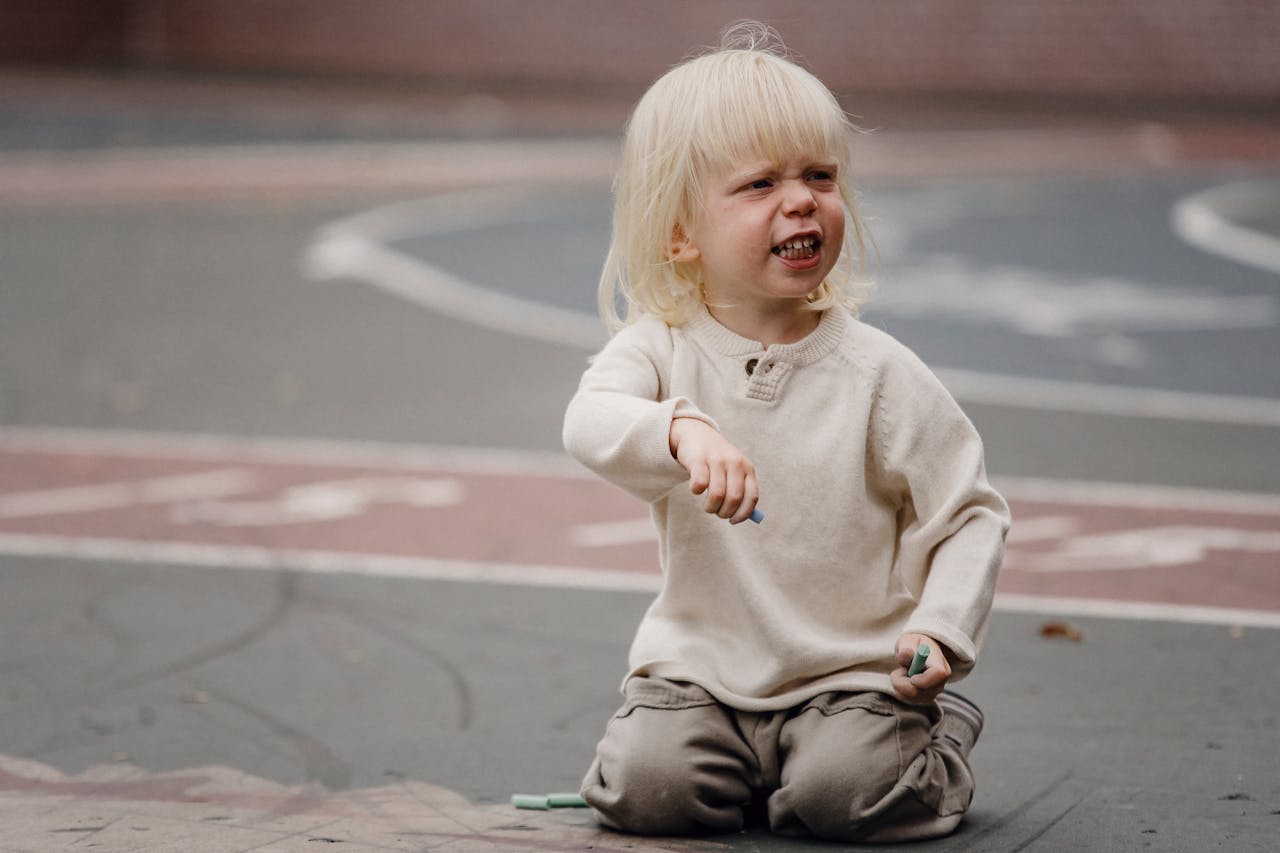When you have a child who seemingly cries all the time, it can feel frustrating and overwhelming. Many parents wonder how they’re going to get through the day or how they can possibly adapt to the constant stress. However, understanding why your child is crying can help you determine not only how to better empathize with your child’s needs, but also how to decrease those tear-filled sessions. Figuring out how to deal with a child that cries over everything can be frustrating, but as a parent, you can use a number of strategies to reconnect with your child and help them cope with big feelings.
Why Does Your Child Cry All the Time?
If you’re trying to figure out how to deal with a child who cries over everything, start by understanding that kids usually don’t cry without a reason. If your child is constantly crying, there is probably something behind it. It may feel as though your child is crying over little things. However, taking your child’s feelings into account can make a big difference in your overall understanding of their emotions and needs. Whether your child is overstimulated, making a little thing feel more like a big one, or struggling with a big change or event going on at home, there are several factors that can come into play when dealing with big feelings.
Understanding Normal Child Development
Crying is a normal part of development for toddlers and young children. If you have a toddler that cries all the time, it could be because they lack the verbal ability to communicate, and crying is the most effective way they know to express themselves. A crying toddler could be:
- Upset over a loss of control;
- Lacking the necessary communication skills to express why they’re having a hard time;
- Struggling with big feelings.
Toddlers often do not yet have the language to describe and explain their feelings or where they come from. If the child seems out of control, offering empathy and support can help them through a difficult moment.
Common Reasons Behind Excessive Crying
There are a number of triggers that can lead to excessive crying.
- Emotional triggers: Frustration or fatigue can cause emotions to swing out of control quickly, making it difficult for children to explain themselves or deal with those feelings.
- Physical triggers: Teething, illness, discomfort, and hunger can all increase the odds of a major crying spell. Physical discomfort can decrease children’s ability to control their emotions.
- Behavioral triggers: Attention-seeing or boundary-testing behaviors can lead to excessive crying in some children, especially if they realize it is likely to get the response they want.
When a little one seems to be melting down or crying over small things, check for bigger issues that could be behind those tears. Eliminate physical issues, including discomfort, sensory challenges, or illness, then move on to concerns like ongoing frustration or fatigue, before assuming that the issue is behavioral. These simple steps can go a long way toward helping you learn how to deal with a child that cries over everything.

Credit: Pexels
Understanding Emotional and Behavioral Crying
As you try to determine how to deal with a child that cries over everything, make sure you understand the difference between emotional and behavioral crying. Emotional crying is usually the result of strong emotion or overwhelm. Behavioral crying, on the other hand, could be the result of a behavioral disorder or other challenge, including tantrums or attention-seeking behavior.
Emotional Sensitivity in Toddlers and Young Children
Some children are more emotionally sensitive than others. If you have a toddler that cries all the time, it could be because you have a sensitive kid. A sensitive child is generally more aware of small changes in the environment, from emotional changes like a shift in relationships to physical changes like their clothing or food. They may also have a harder time calming themselves down when they experience intense emotions.
As a parent, you need to support emotionally sensitive children. Prepare them ahead of time for what to expect when going into a new situation or setting. Work with them on coping skills, including how to self-soothe and calm themselves down. You should also set clear boundaries around acceptable behavior: while crying is fine, for example, throwing a tantrum is not, especially as children get older.
Addressing Behavioral Crying – Tantrums and Attention-Seeking Behavior
Many parents, when they ask how to deal with a child that cries over everything, are really asking how to deal with behavioral crying, including tantrums and attention-seeking behavior. If your child is crying and screaming, and there is not a genuine threat to their physical or emotional well-being, there are several strategies you can use to decrease tantrums and improve overall behavior.
- Stay calm yourself. If you lose your own temper, it can be more difficult to calm your child down.
- Acknowledge your child’s feelings, in cases where there is an obvious emotional reason for the tantrum or meltdown.
- Offer a distraction. Try to separate your child from the environment.
- Set clear expectations for behavior, especially if you will be entering a new environment. Remind your child that if they step outside those boundaries, there will be consequences – and enforce them.
- Ignore your child while they throw a tantrum. Let them know that you will be present to talk to them when they are calm again.
How to Deal with a Child that Cries Over Everything
When figuring out how to deal with a child who cries over everything, it’s important to develop coping strategies that help you manage your own emotions and effectively calm your child.
1. Staying Calm and Composed
Any time you’re dealing with a crying child, it’s important for the parent to stay calm – whether you’re trying to figure out how to deal with a child that cries over everything or you’re dealing with a surprise tantrum from a child who is usually more collected. Caregivers who cannot maintain their own sense of calm may make the tantrum worse. Instead:
- First, make sure your child is safe. Remove anything dangerous from the area, or remove them from a potentially dangerous area, if needed.
- Take deep breaths.
- Remind yourself that big feelings can lead to big reactions, and that your child may not be in control, at the moment.
- Reach out to others for support, especially if tantrums or crying seem to last for a long time.
In addition, parents can remove themselves from the situation if needed, especially if they feel that they may overreact to a child’s tantrum. Learning how to deal with a child that cries over everything can be incredibly stressful for many parents. Taking breaks, including leaving the child with a trusted caregiver, can help improve parents’ emotional stability.
2. Identifying the Root Cause of the Crying
As you work on how to deal with a child that cries over everything, look for underlying causes of crying, especially in cases where your child may regularly cry. It’s important to identify whether your child is crying due to behavioral reasons, physical needs, or emotional distress. Consider:
- Is there a specific time when your child is more likely to cry?
- Are there similar factors that you see crop up regularly when your child is out of sorts? For example, is your child more likely to cry if they are hungry? If they are around a certain child?
- Do you notice your child regularly complaining about similar circumstances?
Imagine there is this little girl, Hope, who has regular crying jags and tantrums around 6:00 every evening, just when her mom is trying to fix dinner. Hope doesn’t eat very well at school because she is too busy talking to her friends, so by dinner time, she’s hungry – and that can send her emotions spiraling. Her mom discovers that if she feeds Hope a snack around 4:00, Hope is calmer through the evening, and she can get dinner on the table with fewer tears.
Jasmine, on the other hand, often breaks down in tears when her mom’s friend and her son, Matt, come over to play. After observing the children more carefully, the moms discover that Matt is very bossy, which upsets Jasmine. More time spent interacting with the children, rather than simply letting them play on their own, allows the moms to create a safer, friendlier environment for both of them.
3. Providing Comfort Without Overindulging
It’s important, when deciding how to deal with a child that cries over everything, to find a way to balance comfort and independence. You want to provide support to your child, but you also don’t want to reward excessive crying, especially if it’s done for behaviroal reasons. Keep in mind that affection is key in helping children feel secure. Offer hugs, validate their emotions, and discuss the reasons behind the tears.
How to Help Your Child Stop Crying: Practical Strategies
Fortunately, there are healthy ways you can help your child stop crying. It’s not just about how to deal with a child that cries over everything in the moment. It’s also about providing the child with healthy coping strategies.
Setting Clear Boundaries and Expectations
Even when your child is a toddler, it’s important to set clear boundaries and expectations. They need to understand that crying and screaming won’t always change the outcome of a situation. School-age children can understand that parents and other children around them have needs, too. Introduce those boundaries and expectations before you enter a situation. For example, if your child is prone to crying at the grocery store because they can’t pick out candy in the checkout line, discuss it ahead of time.
Teaching Self-Regulation
Emotional regulation skills are critical for children of all ages. Try strategies like:
- Identifying emotions;
- Deep breathing;
- Using fidgets or calm-down tools in public.
Work with your child to find the tools and solutions that are most effective for their needs. Parents may need to model those strategies themselves in order to maximize the improvement they see from their children.

Credit: Pexels
When to Seek Professional Help
Sometimes, as you work on how to deal with a child that cries over everything, you may start to wonder if a child’s constant crying could be a sign of a developmental, sensory, or emotional disorder. Children with sensory processing disorders, for example, may have more trouble dealing with their enviornments due to overstimulation. Likewise, a child struggling with depression or anxiety may have more trouble regulating their emotions. Know when to ask for help in dealing with those concerns. If you need to ask a professional how to deal with a child that cries over everything, their support can prove essential in navigating the challenges ahead.
Consulting with a Pediatrician or Child Psychologist
If crying is linked to other developmental concerns, including ADHD or autism, early intervention is key. Talking to a pediatrician or child psychologist can provide you with more information about whether your child is meeting normal, age-appropriate emotional milestones or if there might be more serious issues at play. Consider:
- Does your child seem to cry without an obvious trigger, or prove difficult to soothe when crying?
- Does your child react strongly to changes in their environment or to emotional triggers?
- Does your child seem to have very big feelings for their age or developmental level?
- Is your child easily overwhelmed in loud or challenging environments?
If you have a highly sensitive child, do not hesitate to consult a developmental psychiatrist or child psychologist. Often, they can evaluate your child and provide you with deeper insight into how you can support them.
Do You Need Help with How to Deal with a Child That Cries Over Everything?
While it can be stressful, understanding and addressing the root causes of crying is essential. Every child is different, which means it can take time and even more than one approach to successfully deal with those challenges. However, with consistency, patience, and empathy, you can gradually reduce excessive crying and create a happier home environment. If you need more help with how to deal with a child that cries over everything, do not hesitate to reach out to a professional for more support.
Struggling to find the best parenting advice or the appropriate way to handle challenging behaviors? Join our Online Parenting Classes, led by certified All About Parenting experts. Gain practical problem-solving skills and learn how to deal with a child that cries over everything. Enroll today and take the first step toward more peaceful parenting!
Do you have parenting questions or even concerns about your own feelings? Ask Sophie, our AI-assisted expert, available 24/7 to provide answers and support for all your parenting needs.
References
Brezack, N. Meyer, M. & Woodward, A.L (2021) Three-year-olds’ Perspective-taking in Social Interactions: Relations with Socio-cognitive Skills, Journal of Cognition and Development, 22(4), 537-560, https://doi.org/10.1080/15248372.2021.1901713
Kostromina, S. N., Gurieva, S. D., Borisova, M.M., & Khomyakova, E.G. (2016). Trust in and Perception of Parents in Children with Different Coping Strategies. Procedia – Social and Behavioral Sciences, 233, 35041. https://doi.org/10.1016/j.sbspro.2016.10.123
McDonald, N., & Messinger, D. (2011). The development of empathy: How, when, and why. In A. Acerbi, J. A. Lombo, & J. J.Sanguineti (Eds), Free will, Emotions, and Moral Actions: Philosophy and Neuroscience in Dialogue. IF-Press. https://local.psy.miami.edu/faculty/dmessinger/c_c/rsrcs/rdgs/emot/McDonald-Messinger_Empathy%20Development.pdf
Niemiec, C. P., & Ryan, R. M. (2009). Autonomy, competence, and relatedness in the classroom. Theory and Research in Education, 7(2), 133–144. https://doi.org/10.1177/1477878509104318









